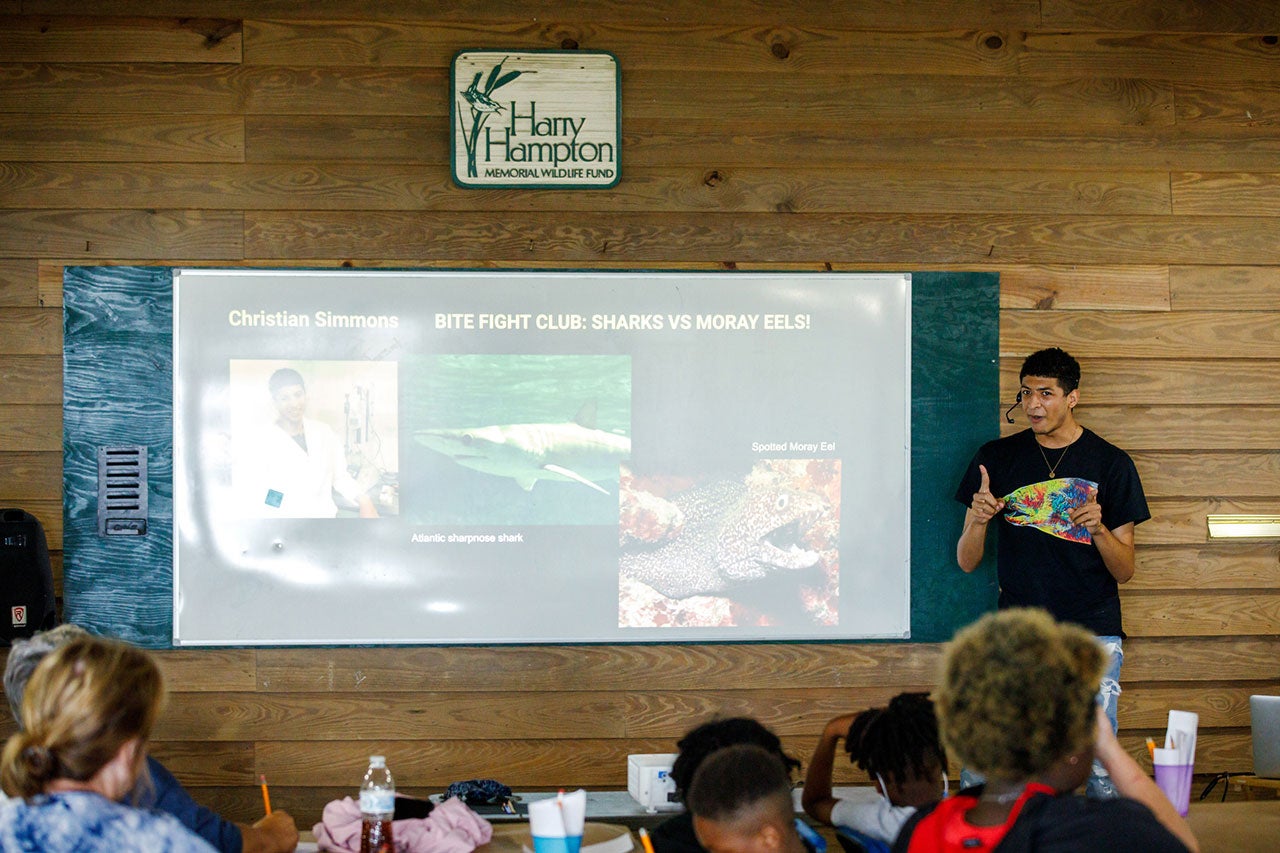Above: Christian Simmons talks with children about aquatic predators.
Talking about science to a room full of fidgety, distractable elementary age kids was a lot easier than College of Charleston marine biology major Christian Simmons expected. On a recent rainy afternoon, Simmons and 12 other students from the College gave lightning (two minute) talks to kids ages 5 to 12 that had them cheering about spotted moray eels, seaweed and mud snails.
The presentations were the result of a collaboration between the organization CULTIVATE SciArt, which connects the arts and sciences with larger audiences, the College’s Research Experiences for Undergraduates (REU) program, and the Pink House, a nonprofit neighborhood resource center in West Ashley, which brought children in to learn about the CofC students’ research.
“We were really fortunate to be able to combine public engagement, outreach to underserved communities, student-driven science and interactive art in one event,” says biology professor Bob Podolsky, who has served as the REU program director since 2014.
Podolsky, who is overseeing the final year of a grant that supports the program, says the CULTIVATE event was a “saturating experience for the kids; they were poking around in the marsh, creating art out of sand and holding horseshoe crabs in their hands at the touch tank.”
“Having taken so many science classes where I had to write reports, I was used to using very technical language,” says Simmons. “When writing for the public [in our program blog], I had to take into account their lack of expertise in the field, breaking down large ecological concepts into understandable pieces of information.”
When the students learned that they were each going to present two months of research in two minutes to the children from the Pink House program, Simmons was nervous.
“I knew the REU program and 12 seasons of Shark Tank would provide me the knowledge to plan out and execute a solid elevator pitch,” says Simmons. “But when I found out it would be given to elementary age kids, that’s when I panicked. Children that young can be unapologetically honest, not to mention tougher to please than Gordon Ramsay and Simon Cowell combined. Then I reminded myself that all scientists are big kids with a lot of questions.”
Simmons’ exuberant presentation energized the audience.
“I decided to frame predator-predator interactions as a boxing match so individuals would be able to better understand the different physiological traits of sharks and moray eels, and why predators are important to coral reefs,” he says.
The prestigious REU program is funded by the National Science Foundation (NSF) and the College’s School of Sciences and Mathematics (SSM) and combines independent research with activities that promote career development and science communication skills.
“Part of our pitch to NSF to fund the program is to bring scientists out of the ivory tower to communicate clearly about their research to the general public,” says Podolsky. “In our program this year, I had students write their own blog posts, prepare lightning talks for different audiences and be interviewed by a podcast about their research.”
The REU program was cancelled during the summer of 2020 because of the pandemic, but this summer Podolsky was able to restart the program by paring it down to local students to avoid restrictions on travel and housing. Traditionally, hundreds of college students from across the country apply for the program and live on site for 10 weeks. The program’s location at GML puts it right on the Charleston Harbor and within reach of GML’s partners at Fort Johnson, which in a typical year contribute mentors to the program from institutions such as the Medical University of South Carolina, the S.C. Department of Natural Resources, the National Oceanic and Atmospheric Administration and the National Institutes of Standards and Technology. It’s a unique opportunity for college students to immerse themselves in marine science as practiced by different agencies.
“Breaking the research down to tell a story for different forms of commonly consumed media and audiences helped me to better understand my research,” says Honors College student Sophie Spiegel, a public health major, who documented her research on the benefits of farming seaweed in the blog post “Serving up seaweed: a culinary solution to climate change?”
The REU program allowed Spiegel to develop a pilot study that will be the first step in determining if seaweed farming is a viable ecosystem service or food source for Charleston.
And for Emily Dombrowski, a double major in biology and French, the program gave her a variety of new experiences that allowed her to put the skills she’s learned in classes and labs into action in the real world.
“I loved interacting with the crabs and developing the project from the ground up,” says Dombrowski. “I captured each horseshoe crab used in my study from Charleston Harbor. I made the solutions for blood dilution and developed the protocols for heart rate monitoring. It was a really amazing opportunity to apply the critical thinking skills that I’ve learned in classes and labs to my own project. At one point, I had 21 horseshoe crabs ranging from two to nine pounds that I had to come in and take care of each day. It gave me a new appreciation for all the behind the scenes work that goes into conducting research; from taking care of animals to making the materials needed for my project.”
The students’ research will soon be featured on episodes of “Conservation Connection,” a podcast hosted and produced by Chance and Sarah Kathryn Ruder, who run the environmental education nonprofit Last Chance Endeavors.
The REU program will conclude with its summer research colloquium on Aug. 4, 2021, from 9:45 a.m. to 2:45 p.m. at the Fort Johnson DNR auditorium at 217 Fort Johnson on James Island.







